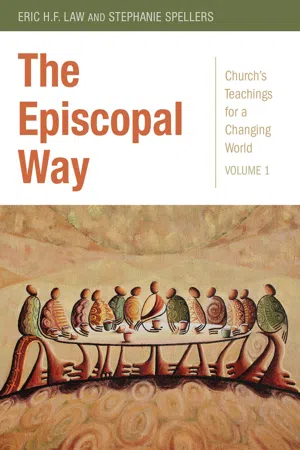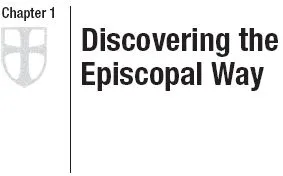![]()
PART I
Introduction
![]()
Imagine the scene: A long-time Episcopalian and a college student are working beside each other at the local soup kitchen:
Mark: What’s an Episcopalian?
Susan: How did you know I’m an Episcopalian?
Mark: Your apron. It says, “Hug me, I’m an Episcopalian.”
Susan: Oh. Yes, I go to St. Paul’s Church, just down the street. We’ve been on the same corner for 150 years and just completed a million-dollar renovation of our organ.
Mark: I think I know the building you’re talking about. It has red doors. I thought it might be closed, but if you’re there Sunday mornings, I guess that’s why I never saw the doors open. So tell me again: what’s an Episcopalian?
Susan: Well, we’re a liturgical church, maintaining catholic traditions, but we’re not the Roman Catholic Church. We’re part of the Anglican Communion, a whole family of churches that stem from the Church of England. The Episcopal Church is the branch rooted here in America, founded just as the Revolutionary War finished.
Mark: (silence) No offense, but I’m not sure what a lot of what you said means. Liturgical? catholic but not Catholic? Anglican?
Susan: Maybe you heard about us on the news several years ago? The gay bishop?
Mark: Right! You’re the ones who split over homosexuality.
Susan: We didn’t actually split. Some folks did leave, but Episcopalians describe ourselves as following the Via Media, and that means we can hold many theological perspectives in tension, but still gather at the same Eucharistic table.
Mark: (silence)
Susan: Did I lose you again?
Mark: It’s okay. How about we get started? I think the guests are coming in now.
Susan is not the only one who struggles to explain her church’s story. Many Episcopalians can recall that moment in the soup kitchen, or on the train, or at the dinner table, when the questions arose …
“What’s an Episcopalian, anyway?”
“What is the Church of England?”
“How do you read the Bible?”
“Is your church doing anything around justice?”
There are good answers to those questions, but the words—and the content—may not come when we need them most. No matter how genuine our desire to connect and welcome others, many church members struggle to find the information or a way to share it in the real world. It is one thing to tell what the Episcopal Church is not, but naming what it is seems strangely difficult.
It’s not just a struggle for laypeople. Clergy are well trained for academic discourse about historical-critical scriptural interpretation, soteriology, and postmodern missional engagement. But the teachings aren’t worth much if you don’t know how to talk faith in everyday language with the woman next to you on the bus, the people behind you in line for movie tickets, the maintenance man who sees a cross in your living room, or the friend in the hospital who doesn’t understand why God would let this happen to her.
Road Rule 2 Practice Holy Curiosity: In the midst of a conversation, listen with curiosity and pay attention to the other person’s story, experience, values, belief, struggles, passion, pain, joy, etc. When it is time for you to share your own story, you will be better prepared to truly connect with your conversation partner.
Back in the 1950s, it was a safe assumption that people in the United States went to church and had a working knowledge of Christianity. On the flip side, if a family did not go to church on Sunday—perhaps they were followers of a different religion or had no religion at all—they might earn suspicious looks from the neighbors. Churches thrived under this favoritism. The presumption was: If we have a better building, a better music program, a better youth group—if we do what we do better—people will choose us.
The whole system depended on a cultural norm that favored the church. That norm is gone.
The Church/World Rift
There is a lot more to this story and this struggle, and we will explore it soon. For now, it is enough to note that, in the absence of this cultural norm, a new landscape has emerged. To begin, there are the “emerging” or “emergent” generations (such as the young person in our opening dialogue). For Christians in this group, going to church on Sunday is one of several options, and not the most popular. In fact, a growing proportion of people born after 1965 (Generations X and Y and the Millennials) now claim no faith at all—32 percent of people ages 18–29 and 21 percent of people 30–49.1 Much of their knowledge of Christians, Christianity, and the church today comes from the media or outdated stories from their childhood. Many church people do not know how to speak to this younger generation. As a result, emerging generations increasingly don’t connect to faith communities at all.
A similar chasm separates churches from a growing proportion of the American population. Diana Butler Bass talks about this turn-of-the-century shift in Christianity After Religion: The End of Church and the Beginning of a New Spiritual Awakening:
The first years of the twenty-first century marked a swift and shocking reversal of the religious mood of the late 1990s. Before the millennium, American religion went through a period of optimism, growth, and wealth. Indeed, from 1990 to 2000, Americans expressed increasing confidence in religious institutions and religious leaders. The religious favorable rating now hovers around the confidence rank of Wall Street and major corporations.2
Why the sinking sentiment? People look around and see the troubles of the post-9/11 world and can’t help but blame religion for being part of the problem instead of the solution. Sex abuse and embezzlement, battles over sexuality, withdrawal from wounded neighborhoods, religious wars, rituals and doctrines that appear other-worldly and disconnected from daily life—each has played its part in driving a wedge between people in the church and the communities around us.
Show Me the Way
If church is no longer privileged, then Christians will need to become missional, that is, outwardly focused on relationship with people who are not part of church, and even with people who are in church but stand at the margins, so that together we can share the life and love of Jesus. If Episcopalians are going to get missional and build meaningful relationships with people around us, we must do two things: 1) be curious and open to other cultures and perspectives, and 2) be mature in our understanding of our Christian and Episcopal identity.
The first part—being curious and receptive—happens as we get to know the stories of people who are not part of church. It happens when we cross boundaries and open to embrace the Other (the one who is different from the “norm,” who is not part of the church, or who holds less power in the church).
The second move is just as important: church folks will need to spend time getting to know and share the things that give shape and life to our Christian identity. For Episcopalians, that means a better understanding of something called the Episcopal Way: not simply a common set of doctrines, ideas, or even words to pray, but a combination of practices, attitudes, and an approach to God known as a “Way.”
There are plenty of reasons to appreciate this phrase, The Episcopal Way. First, because the early disciples were known as followers of “the Way,” before they were even called Christians (see Acts 9:2). Jesus called himself “the way, the truth and the life,” and those who turned their lives inside out to identify with him were knowingly following the Way.
Second, speaking of the Way, as in a path or road, suggests that the Episcopal Way is a journey. Indeed, it begins with the original story of Jesus’ disciples and winds through centuries of the church’s development, failure, and redemption. It continues to this day, as we face an exhilarating and quickly changing world. It broadens into a future for which we must remain flexible, curious, and grounded. Walk even a little while with Episcopalians, and you understand that for us faith is a journey, one with a beginning, a middle, but no true end … except closer relationship with God through Jesus Christ.
Finally, a “way” is a method, style, or manner of doing something. For us, this means the Episcopal Way is not just something you believe; it is something you do. A Latin phrase captures this wisdom: lex orandi, lex credendi. Loosely translated, it means: “the law of praying is the law of believing.” In other words, the way we pray shapes or conditions the way we believe. You become Episcopalian by practicing the Episcopal method of following Jesus, praying as Episcopalians have prayed for centuries, and living the Episcopal style of building community and relating to neighbors. No signature on a faith statement is required. Live with us, pray with us, practice the Way with us, weave it into your own life. Then you will understand. It is a roomy way of being Christian, and a deeply faithful one.
No wonder it was hard for Susan, the long-time Episcopalian in the conversation at the beginning of the chapter, to explain the Episcopal Church to Mark, the young adult at the soup kitchen. The Episcopal Way can be tough to summarize in twenty-five words or less, especially in a world with an increasingly short attention span, instant access to information, and a penchant for multi-tasking. Yet, this way of being Christian might just be an ideal fit for the communities where we live and move today.
The Episcopal Way brings the stories and eternal truth of scripture alive so that we hear God’s voice speaking in our everyday lives. This Way challenges each generation to learn and appreciate tradition, and to add its own wisdom to the constant process of updating and translating traditions so they continue to speak today. This Way celebrates the gift of reason, so we can engage the world as it is and figure out the path that leads us closest to God’s dream.
As Episcopalians, we don’t claim to be perfect at following the Way, and God knows we have made our share of mistakes on the journey. Yet even these imperfections have their place—they remind us that it is not our power, but the grace and love of God that carry us through this sometimes messy, often confusing, always shifting process of fully living as Jesus’ body in the world.


